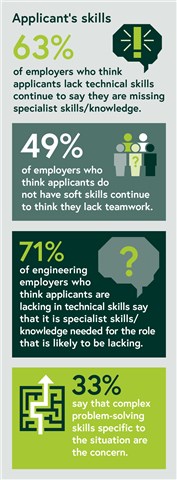We carry out an annual skills survey of engineering employers in the UK. In 2021 we focused on the current skills challenges employers are facing, identify barriers to building supply of the needed skills, and the skills that will be needed in future.
Download your free copy of the report for more findings, conclusions, and recommendations: theiet.org/skills
 Disruption due to the Covid-19 pandemic has greatly affected businesses of all sizes with some staff switching to working from home, some becoming ill and having to self-isolate, and others being furloughed or made redundant, not to mention site closures and decreases in sales. There are also impacts caused by Brexit. This survey found around half of respondents have experienced difficulties importing/exporting and a quarter claimed that leaving the EU has caused a shortage of labour/skills.
Disruption due to the Covid-19 pandemic has greatly affected businesses of all sizes with some staff switching to working from home, some becoming ill and having to self-isolate, and others being furloughed or made redundant, not to mention site closures and decreases in sales. There are also impacts caused by Brexit. This survey found around half of respondents have experienced difficulties importing/exporting and a quarter claimed that leaving the EU has caused a shortage of labour/skills.
However, eight-in-ten are confident about their economic prospects and are beginning to turn their attention to upskilling their workforces, both for reducing the skills gap as well as preparing themselves for net zero carbon emissions by 2050. Around half of the respondents call on the UK Government to provide more funding for apprenticeships and better careers advice in schools as well as business grants for training and reskilling programmes to help them hit these targets.
Looking to the next five years, engineering employers do recognise particular areas of skills as important for their organisation’s growth. However, whether or not they currently have these skills within the workforce varies considerably. Design and manufacturing is recognised as a key area by (36%) and most (64%) of those have the skills they think they need. However, energy and environmental sustainability is the second most cited area for growth (35%) and only half (51%) have the skills they need.
In light of this lack of skills, it is unsurprising that only half (50%) think it is achievable for their organisation to be net zero by 2050, in line with the UK target. Many recognise that sustainability will become more important in the near future (64%), driving this skills growth, but much fewer think sustainability is currently embedded in their organisation’s work (37%). Echoing the earlier point, it is important that engineering employers act now to gain these skills – training is likely to be much more difficult at the point of immediate need, as it was in the pandemic.
Around a third of engineering employers have taken some action to increase the diversity of their engineering, IT, and technical workforce in terms of gender (33%) or ethnicity (30%). These do represent increases compared to similar questions asked in 2019 (19% gender, 12% ethnicity) and 2017 (15% gender, 9% ethnicity) suggesting a long-term positive trend amongst engineering employers addressing imbalances in the gender and ethnic diversity of staff.
Young people entering the workforce is often a valuable pipeline of new skills, but many engineering employers have concerns. Just under half think that young people do not have the technical skills or soft skills they need (both 46%). While some are prepared to offer training to supplement these skills (45%), others do not have the resources and instead do not recruit from this pipeline (25%). As ever, there is a mismatch between the priorities employers stress for the education system and their own activity within that system. Given the importance of getting new skills into the industry, employers who lend their expertise have the opportunity to shape the future workforce.
Overall, the results of this survey suggests that businesses are recovering from the uncertainty of last year. However, there is also a cautionary note in that engineering employers should be conscious of the skills they will need in the near future, building resilience and preparedness into their current strategies.
Download your free copy of the report for more findings, conclusions, and recommendations: theiet.org/skills